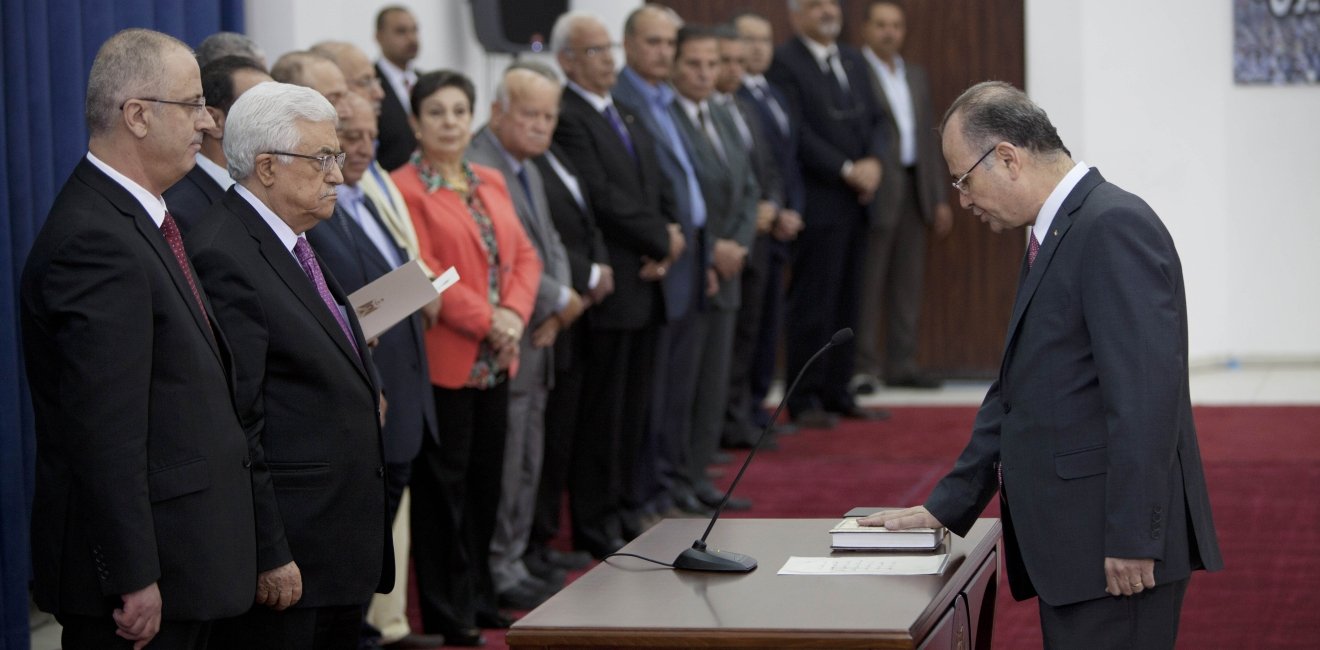On April 29, a heated shouting match erupted between the Emirati foreign minister and a Palestinian official in Riyadh, in which Emirati Foreign Minister Sheikh Abdullah bin Zayed reportedly likened the Palestinian Authority to “Ali Baba and the forty thieves.” He then said out loud what Gulf states have been saying privately for months: “Why would the UAE give assistance to the Palestinian Authority without real reforms?”
Increasingly frustrated, they describe Mr. Abbas as being as big an obstacle to a two-state solution as Israeli Prime Minister Benjamin Netanyahu.
The bust-up speaks volumes about the longstanding argument between Arab states and Palestinian leaders. Arab governments, like the Biden Administration, see a reformed, more inclusive PA as critical to forming an alternative to Hamas to govern Gaza and a foundation for a two-state solution. They believe Mr. Abbas is refusing to open up the Authority outside his inner-circle and is dragging his feet on reforms. Increasingly frustrated, they describe Mr. Abbas as being as big an obstacle to a two-state solution as Israeli Prime Minister Benjamin Netanyahu.
Yet amid these accusations, the team of technocrats Mr. Abbas tapped in March to overhaul the Authority say they are moving full speed ahead on a series of herculean reforms to overhaul the PA and kickstart the rebuilding of Gaza at the weakest point in the Authority’s history. With Israel’s withholding of tax revenues crippling the Authority three months into their two-year plan, they say they need international support for the Authority to survive the summer.
The technocrats
On March 18, Mr. Abbas tapped Mohammad Mustafa, an economist and former head of the Palestinian Investment Fund, as prime minister to form a technocratic government. Despite not having held political office, Mr. Mustafa is considered a close Abbas ally. His appointment, which was not discussed with other Palestinian factions, rankled Fatah, Hamas, the UAE, Saudi Arabia, and the US—the latter three had their own preferred candidates and had requested a unity government.
Mr. Mustafa duly formed a cabinet of technocrats, none with party or faction affiliation and many with experience in the World Bank and UN bodies, with multiple ministers boasting family ties to Gaza.
Domestically, the plan has three main tracks: strengthening Palestinian institutions, improving the Authority’s fiscal health, and empowering the private sector.
In late April, based on consultations with the US and the EU, the team devised a two-year plan to overhaul the Authority and prepare to govern Gaza “within days” of an agreement with Israel. Domestically, the plan has three main tracks: strengthening Palestinian institutions, improving the Authority’s fiscal health, and empowering the private sector.
The reforms
Key to these reforms are laws and bylaws ensuring full independence of the judiciary, shifting the appointments of the high judicial council and the constitutional court away from the PA presidency, and modernizing the courts system. In light of the 17 years of laws and regulations passed by Hamas during its rule of Gaza, the technocrat government is working in parallel to unify the West Bank and Gazan legal systems—the government aims to complete the judicial overhaul by the end of 2025.
Under its fiscal reforms, the technocrat government aims to diversify tax revenues from channels independent of Israel and create an investment-friendly climate. To circumvent some of Israel’s obstruction of PA revenues, the government is moving to establish a bonded warehouse that it says would eliminate tax leakage to Israel and enable the Palestinian government to collect customs on imports directly. The Mustafa government is also looking to empower municipalities by shifting some fee and tax collection and governmental services from centralized institutions to these local governments.
A strengthened, independent State Audit and Administrative Control Bureau and Anti-Corruption Commission is also central to the plan. For the first time, it has publicized the national budget and introduced what they claim is a competitive, transparent process for government appointments and recruitment.
Economically, the cabinet is currently drafting a Public Private Partnership (PPP) law to facilitate private investments in large-scale public projects and infrastructure, to be issued by the end of 2024, and a new tax code lessening the burden on small- and medium-sized businesses.
Importantly, after consultations with the US, the technocratic government is developing a new social safety net under which the PA would provide assistance to families based solely on socioeconomic needs. This key—if controversial—measure would suspend the Authority’s Prisoners Fund and Martyrs Fund, easing a financial burden and bringing the PA in line with the Taylor Force Act, which withholds US aid as long as its payments to prisoners held by Israel and their families continue.
Lastly, atop its checklist to boost human rights in the West Bank and, eventually, Gaza, is revising the draconian cybercrimes law and boosting media freedoms—the government has created taskforces with civil society groups and media organizations to draft new legislation in line with international standards.
The Mustafa government says it is taking steps to strengthen the electoral commission and its independence to prepare for “free and transparent” parliamentary and presidential elections by March 28, 2026—two years on from the technocrat government’s appointment.
Governing and Rebuilding Gaza
To kickstart plans for Gaza’s reconstruction, the government is in talks to establish a trust fund at the World Bank to be overseen and managed by the global body for the reconstruction of Gaza.
The “Gaza Reconstruction Agency”, a new semi-governmental entity separate from the cabinet and the PA presidency, would then coordinate Gaza’s reconstruction on the ground. Under their vision, the revitalized PA would play a “facilitating” role in Gaza’s reconstruction, clearing logistical and legislative hurdles for other governments, international organizations and private sector entities to work in Gaza—while ensuring security.
By placing the fund within the World Bank and establishing the new Agency, the government says it is establishing “strict firewalls” preventing the Authority from using any of the reconstruction funds. The Gaza reconstruction team is currently preparing a master plan for a rebuilt Gaza self-reliant on solar energy, a large-scale desalination plant, a functioning port and new housing complexes—a masterplan they aim to finalize with the UN, EU, World Bank and Arab states and amend with the input of local communities in Gaza.
In order to be ready to administer Gaza on “day one” after the war, the Mustafa government is reviewing its 38,000 civil servants in Gaza to determine which employees to reactivate and to open up recruitment of new, younger Gaza civil servants. It claims it will have a plan in place by the end of June to assume an administrative role in Gaza—however, with large numbers of Authority employees in Gaza past the age of retirement, it remains unclear whether the Authority will have the workforce to take on Gaza governance.
The challenges
Progress in the three months since the technocratic government’s appointment has been modest, but steady. But as of early June, governance and freedoms reforms have stalled and several obstacles emerged.
Until then, faction heads and influential leaders in the PLO and Fatah refuse to help the government sell its reforms, effectively isolating the Mustafa cabinet.
The government faces internal opposition from Fatah factions who do not believe the reforms have the cross-faction buy-in needed to succeed. They are pushing Mr. Abbas to open a dialogue with other political factions, including Hamas, to get united backing for the government and incorporate feedback into its reform package. Until then, faction heads and influential leaders in the PLO and Fatah refuse to help the government sell its reforms, effectively isolating the Mustafa cabinet.
Yet the immediate, biggest threat to efforts to revitalize the Palestinian Authority is Israel’s withholding of its tax revenues, which even the most idealistic technocrats admit will make it “impossible” to carry out reforms.
After far-right Israeli Finance Minister Bezalel Smotrich’s withholding of $175 million monthly tax revenues collected by Israel on behalf of the PA as per the Paris Protocol, May 2024 marked the first month since the Oslo Accords that Israel did not transfer a single cent into the Authority’s coffers—June was set to become the second month until the minister agreed to release the funds in exchange for legal recognition for several illegal West Bank settlements. Meanwhile, Smotrich’s June transfer of $35 million of Palestinian tax revenues to Israeli “victims of terrorism,” was promised to be the first of several reappropriations of Authority funds to Israeli citizens.
Even more catastrophic are Mr. Smotrich’s threats not to renew indemnity given to Israeli banks allowing them to transfer funds to banks in the West Bank; a punitive measure in response to European states’ recent recognition of Palesitnain statehood. The minister agreed to extend the waiver at the last minute as part of the settlement deal, but in four months when the new extension expires he could use it as a bargaining chip again. The loss of tax revenues comes as Gulf states, which up to 2016 were reliable funders of the Authority, continue to wait for concrete reforms before resuming financial assistance.
The Authority runs a monthly deficit of around $125 million and as of late May accumulated $5.4 billion in external debts. After months of paying 50% to 70% of salaries to its 145,000 public sector employees, the Authority may be forced to suspend salaries altogether in June for security service members, teachers, nurses and administrative staff.
As of mid-May, employees began abandoning their posts at public agencies ranging from hospitals to ministries across the West Bank. PLO and Fatah officials warn that the PA is rapidly becoming an institution “on paper” only. The technocrat government, even with its measures to generate local tax revenues, has been unable to find a way out from the growing budgetary and financial crises.
Despite the Biden Administration’s calls for a revitalized PA and pressure on Israel to release tax payments, a lack of funds, along with Mr. Abbas’s refusal to open a dialogue over Palestinians’ political future, is crippling serious attempts to clear increasingly steep obstacles. Instead of a revitalized Palestinian Authority, without an urgent intervention, Arab states and the US may soon be left with a defunct one.
The views expressed in this piece are those of the author and do not express the official position of the Wilson Center.






